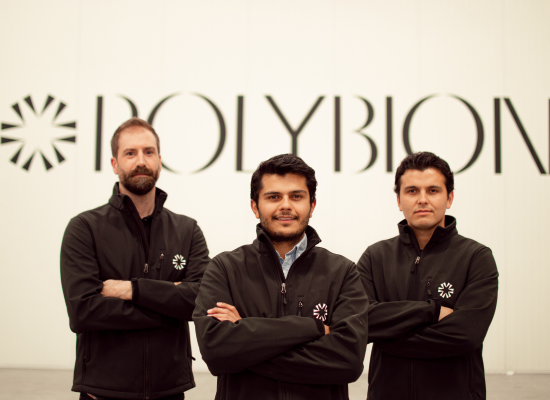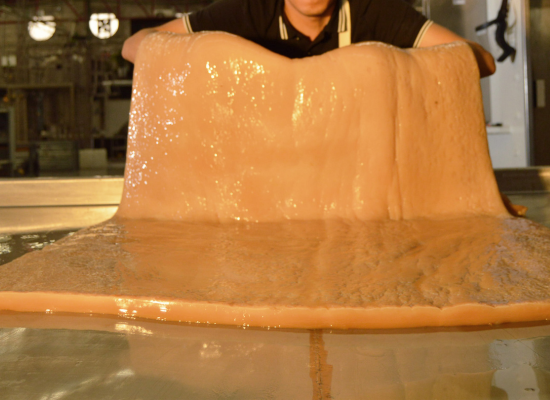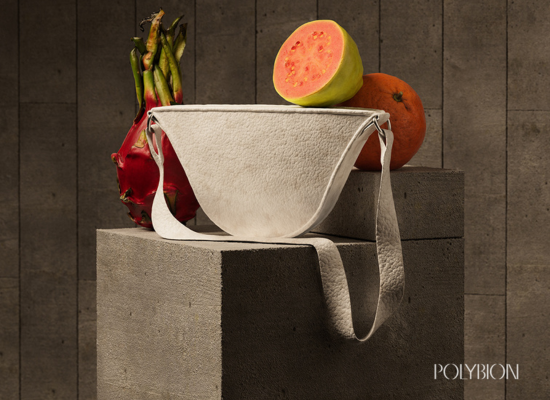Cutting-edge technology modelled on nature’s own design
Polybion started with a shared vision to redefine the materials industry using biology. The journey began in 2014, when Axel Gómez Ortigoza (Co-Founder & CEO), came across a mushroom biomaterial during a synthetic biology competition at MIT. Inspired by the potential of bio-fabricated materials, Axel and his brother Alexis (also Co-Founder & CEO), along with Bárbara González Rolón (now Quality Director), a materials scientist, decided to build a company focused on creating sustainable alternatives to conventional materials. The team began in a tiny lab, experimenting with mushroom-based materials. But as they explored cellulose cultivated by bacteria little time later, they realized its incredible potential as a high-performance biomaterial. The brothers derived a material from a bacterial fermentation process, which could be used to make high-performance leather. By 2019, the group had pivoted entirely to developing bacterial cellulose, which led them to create Celium™, their premium cultivated cellulose.
“Celium™ was born out of the need to create a material that could address the shortcomings of traditional leather and synthetics. Sustainable Chemistry plays a crucial role, especially in our stabilization process (akin to tanning), where we have developed a proprietary method that avoids hazardous chemicals”
, explains Alexis.Today, Polybion operates FOAK I, the world’s first bacterial cellulose biomanufacturing facility, and continues to innovate and scale.The road to success is rarely an easy one and Polybion is no exception. The young company has had to face and overcome many hurdles on its path: Starting with numerous trials and errors typical for an R&D phase to the financing of this highly innovative project. These obstacles were overcome mainly by the team´s conviction of the innovation and its positive impact on the environment. Initially the team had to rely heavily on government grants, awards, and personal investments to stay afloat before securing Series A funding. Scaling was another challenge: As FOAK I, Polybion´s biomanufacturing facility, was the first of its kind for bacterial cellulose, there was no roadmap to follow and the team entered unexplored terrain, iterating extensively to achieve the current industrial-scale production.
The assembly of the right people, a suitable team was crucial as well. The latter consists of multidisciplinary experts of biotechnologists, biologists, engineers, designers, and creative professionals. Currently the young company is counting over 30 members, each contributing unique skills to their mission of transforming the materials world.
“While our expertise spans diverse fields, we’re united by a passion for solving environmental challenges through biology. We like to call ourselves “bioneers”—pioneers in biological innovation”
, explains Alexis proudly. The name of the start-up was chosen to reflect what they do. Poly-” means many, “bio” refers to life, and “-on” represents an entity performing an action. Together, Polybion means “an entity that creates multiple life technologies,” which aligns with the company´s mission to grow life-inspired materials.
Impact requires scale
Polybion´s innovation is Celium™, a premium cultivated cellulose grown by bacteria. It’s not a mimic of leather or plastic—it’s a material category of its own. The technology combines bioengineering with material science. The company uses bacteria to convert fruit waste into a bio-assembled membrane, which they stabilize through a sustainable process to achieve durability, flexibility, and customization.Bio innovations and sustainable solutions around the world face a common challenge: scalability. Polybion recognized it´s importance and built up a solid scaling strategy, which is based on three pillars: volume, consistent quality, and competitive pricing. By leveraging existing fermentation technologies and modular processes, they can produce Celium™ efficiently while reducing resource intensity. This approach not only meets industry demand but also offers a meaningful alternative to materials that rely on extractive or synthetic methods. Furthermore, it also ensures that their technology can be easily adopted worldwide. At the start of Polybion, no other company was innovating with bacterial cellulose at the scale and depth that the start-up envisioned.
Celium™ tackles multiple environmental issues caused by the traditional textile industry. By using fruit waste as their feedstock, they divert organic waste from landfills and reduce methane emissions. Polybion´s production avoids hazardous chemicals, minimizing water and soil contamination. Compared to traditional leather, their process requires significantly less water, land, and energy.
“Celium™ represents a shift toward regenerative material production, enabling industries like fashion and furniture to adopt more sustainable practices”
, elaborates Alexis. Next up at Polybion
Right now, the start-up is scaling production to meet demand from their brand collaborations. They are also raising additional capital to expand capacity and improve their technology. At the same time, Polybion is continuously refining Celium™ to unlock new applications and performance capabilities.The next big step is to bring Celium™ to market through partnerships with brands in fashion, furniture, and automotive sectors. The company also plans to expand their biomanufacturing capabilities to meet the growing demand for biomaterials and eventually license their technology.
Polybion joined the ISC3 Global Start-up Service as the ISC3 Innovation Challenge finalist in July 2024. With their innovative approach, Polybion actively contributes to SDG 9 (Industry, Innovation, and Infrastructure), SDG11 (Sustainable Cities and Communities), SDG12 (Responsible Consumption and Production), SDG13 (Climate Action) and SDG15 (Life on Land).




